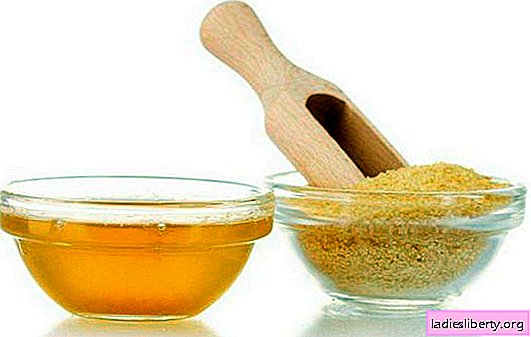
Today gelatin is a popular product.
It became known about him for the first time in the mid-19th century, when engineer Peter Cooperon invented and patented it.
For a long time, gelatin was considered a useless product. But that all changed when Pearl Waite added it to dessert.
Since that case, the properties of gelatin were appreciated, and the scope of application was only expanding.
Gelatin: composition, calorie content, how to apply
The composition of gelatin - a protein of animal origin. In a dry form, it does not have a specific smell and a special taste, it is transparent. It turns out when digesting tendons, ligaments and bones of cattle in water. It tends to swell, but not dissolve in an acidic environment and cold water. When the temperature rises quickly dissolves, and when it decreases, it turns into jelly.
Gelatin refers to high-calorie foods. Its caloric content is quite high: there are 356 Kcal per 100g of product. Excessive use of it in combination with a sedentary lifestyle can lead to an increase in body weight.
Energy value of gelatin:
• proteins - 87.1 g (98%);
• fat - 0.5 g (1%);
• carbohydrates - 0.7 gr (1%).
The composition contains vitamin PP (14.48 mg). This vitamin plays an important role for the body: it participates in regenerative and oxidative processes, metabolism, stimulates the conversion of fats and sugars into energy, lowers cholesterol levels and prevents blood clots, affects the activity of the liver, pancreas, heart, stomach, and emotional state of a person .
There are a lot of mineral substances whose beneficial properties have a beneficial effect on the activity of the whole organism. Gelatin contains:
• iron (2 mg), providing all cells of the body with oxygen, supporting the metabolism process, the work of the nervous system, the thyroid gland.
• Phosphorus (300 mg) - necessary for the proper formation of the skeleton.
• Potassium (1 mg) - regulating water, salt, acid and alkaline balances, normalizing heart rhythm, affecting the work of muscles, endocrine glands.
• Sodium (12 mg) - activates the formation of enzymes of gastric juice, saliva and pancreas, dilates blood vessels.
• Magnesium (81mg) - strengthens the teeth and bone tissue, protects the muscles of the heart, and is able to soothe a person after emotional stress.
• Calcium (34mg) - inhibits normal blood pressure, is involved in the process of blood coagulation.
Gelatin is rich in amino acids: there are 18 species in its composition. The most significant for the body are: glycine, lysine, proline. Glycine for the body at the same time performs the role of energetics and sedative in various stressful situations, participates in the metabolism and synthesis of many substances, has antitoxic and antioxidant effects. Lysine is necessary for the synthesis of collagen and protein, stimulates the growth of the body. Proline serves as the basis for bones, cartilage, dermis and tendons. Able to skin, nails and hair to restore their healthy appearance, improves the functioning of the heart, kidneys, liver, eyes, thyroid gland.
Scope of use:
• Food industry. Known under the name "Food additive E-441". Used in the preparation of most confectionery: marmalade, marshmallow, jelly, marshmallow, cream, cakes, sweets, yogurt. On its basis, preparing aspic, aspic, canned food. For most products, it:
- an indispensable enhancer of taste and color saturation;
- serves as a sausage and meat products protective sheath;
- stabilizer and emulsifier;
- lightens some drinks, for example, wine, juice;
- keeps the shape of confectionery;
- is a frother for baking.
• The medicine. The product is a hemostatic agent, in the diagnosis of bacterial infections is used for the cultivation and cultivation of various microorganisms, is used in the treatment of nutritional disorders.
• Pharmacology: used in the release of candles and the formation of capsules of drugs, means for performing dressings, creating artificial plasma.
• Chemical industry: in the production of X-ray films, photographic and film films, is found in paints and adhesives.
• Cosmetology. Useful properties of gelatin are used in masks and serums for the face, in the means to restore hair, nails.
The wide scope of use is due to its unique properties and diverse composition.
Gelatin: what are the health benefits
The use of gelatin lies in the rich combination of trace elements, vitamins and amino acids in the composition. The following useful properties of the product are generally accepted:
• helps to strengthen the ligaments, joints;
• after injuries and fractures accelerates the healing and healing of bone tissue
• as a source of glycine is important for the harmonious activities of all systems in the body;
• a large amount of protein helps to strengthen the muscles;
• indicated for poor blood clotting;
• restores damaged, thin hair;
• stimulates the production of collagen by the body, necessary for the renewal and tightening of the skin;
• improves the general condition of patients with osteochondrosis, arthrosis, arthritis;
• prevents and reduces the number of available spider veins;
• returns the healthy structure of the nails;
• improves metabolic processes and performance due to the presence of amino acids;
• is an energy source for the nervous system, brain, muscles.
The positive effect of gelatin on the treatment of diseases of the gastrointestinal system was noted. It is capable of covering the mucous organs with the thinnest film, preventing the progression or appearance of erosive and ulcerative diseases.
Those who are watching the figure or trying to regain weight, gelatin is only good. Dishes from it are well digested and easily digested by the body. Many athletes include in their meals mousses, jellies and jellies prepared on gelatin. The reason for this nutrition lies in a significant content of protein, which is a building component of all the muscles of the body.
The advantage of its use is observed not only in the use of gelatin inside. It shows its useful properties, being in the composition of masks, creams, baths.
Gelatin: what's the harm to health
Gelatin does not always benefit the body. In some cases, he is a provocateur of deterioration or exacerbation of health:
• able to increase blood clotting. Therefore, gelatin is contraindicated in the pathologies of the cardiovascular system and in the case of susceptibility to thrombus formation.
• The prohibition of its use is imposed and then, if there is varicose veins.
• Gelatin harms the body by raising cholesterol. With atherosclerosis and heart disease, the use of this product should be abandoned.
• It is not recommended to take the product for gout, urolithiasis and cholelithiasis.
• Contraindication is the detection of oxalate in the urine.
• Excluded from nutrition for kidney disease.
• It is undesirable to use it for inflammation of hemorrhoids, constipation.
• In rare cases, but there is not digestibility of the product by the body. For this reason, they should not overload their intestines and stomach.
• If you identify intolerance to gelatin from the use of products that have in its composition, it is better to refuse.
Being a strong oxalogen, gelatin and its products cannot be consumed by those who suffer from the oxaluric form of diathesis. The product may cause aggravation and further development of the disease.
The presence of oxalic acid can cause a disruption in the body's water - salt balance.
In order to reduce the negative effect of gelatin on the body, it is recommended that doctors in order to avoid constipation, problems with the gastrointestinal tract, introduce fresh vegetables (especially beets), prunes, and oat bran into the diet. These products can improve the motility of the stomach and intestines.
Even a small dose of gelatin can provoke changes in a person’s state, harm health. Therefore, it is necessary to eat it with existing diseases with caution and after the examination with the attending physician.
Gelatin for children: useful or harmful
Gelatin at the same time bears the benefit of a growing, forming children's body and harm. Nutritionists and doctors warn parents about the dangers of gelatin for children under 2 years. It can irritate the walls of the weakened ventricle and intestines of the baby, thereby causing digestive disorders.
The use of gelatin for a child’s body consists in the presence of essential amino acids and trace elements. They are important for:
• bone formation;
• growth and strengthening of teeth;
• tissue development of all organs;
• formation of immunity;
• functioning of all systems and organs;
• proper physical development.
Children usually enjoy eating pieces of frozen gelatin (jelly). And if boiled vegetables, fish, meat, fruit, berries are added to them, then the benefits of such food only increase.
Therefore, parents should not be afraid to give the child products based on gelatin. But it is also impossible to "feed". In everything there should be a measure. Desserts, floods are recommended to give children no more than once a week. The ideal option are products made at home from natural products, without the addition of dyes and artificial sweeteners.
Use or harm will bring the body the use of gelatin and products from it directly depends on ourselves. It is important to be attentive to your health and, in case of existing problems, reduce or eliminate it from the diet.











